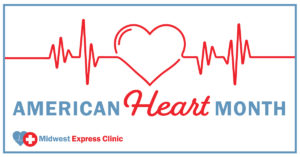American Heart Month: Promoting Heart Health For All
 February is a month filled with love and hearts in celebration of Valentine’s Day, but it’s also recognized as American Heart Month by the National Heart, Lung, and Blood Institute (NIH). It’s important to take care of your heart health as the leading cause of death in the United States is heart disease. Thankfully, there are ways you can help improve your health and encourage loved ones to do the same, lowering risks of heart attack and stroke.
February is a month filled with love and hearts in celebration of Valentine’s Day, but it’s also recognized as American Heart Month by the National Heart, Lung, and Blood Institute (NIH). It’s important to take care of your heart health as the leading cause of death in the United States is heart disease. Thankfully, there are ways you can help improve your health and encourage loved ones to do the same, lowering risks of heart attack and stroke.
Steps to Preventing Heart Disease
Lowering your risk of heart disease is as simple as making a few healthier lifestyle choices.
- Get active. Aim to get 2.5 hours of physical activity per week – just 30 minutes a day, 5 days a week. Muscle strengthening workouts should also be performed two days per week. While some may find it difficult to fit in the time, keep in mind it doesn’t even need to be done all at once. Try to at least get some activity in, whether it’s 5 minutes a few times a day, or split into two 15 minute workouts. Anything you can do is better than nothing!
- Eat healthy. Eating a nutritious diet is important for all aspects of our health. For your heart, a diet low in sodium and saturated fat is best. This includes vegetables, fruits, whole grains, fish, poultry, low-fat dairy products, and more. Sugar and other sweeteners should also be limited. For great recipe ideas and inspiration, check out the NIH Delicious Hearth Healthy Eating page.
- Lose weight or maintain healthy weight. Obesity takes a toll on the heart and increases your risk for not only heart disease, but also stroke, high cholesterol, high blood pressure, and diabetes. Discuss with your physician what a healthy weight is for you and how you can safely achieve your goals through proper diet and exercise.
- Stress less, sleep better. This one may be easier said than done for some, but it’s important to work on. Stress and poor sleep both contribute to high blood pressure. Practicing meditation techniques, being more physically active, and regularly talking with a trusted friend or professional can all help reduce stress and, in turn, improve sleep. You can also improve sleep by following a regular bedtime and not eating late at night.
- Quit smoking. Smoking is harmful to the heart and blood vessels, increasing the risk of heart disease and other chronic health issues. It can be difficult for many to drop the habit, but help is available through various websites – gov and smokefree.gov – or discussing options with your doctor.
Making a lifestyle change can be difficult, no matter how driven you feel. Talk with family and friends around you about your goals so they can offer you support and perhaps even participate with you. Working together makes everything a bit more fun, from attending workout classes to cooking healthy meals for one another. Eventually, these changes will become healthy habits that will help improve your overall quality of life.
Get Regular Heart Health Screenings
While it’s easy to determine which lifestyle choices you need to improve on, if you are unaware of your blood pressure, total cholesterol, or blood glucose numbers, you won’t have the full picture. Many of these problems come without symptoms, but present a risk that demands attention.
- Blood pressure: An elevated blood pressure greatly increases your risk of heart disease and stroke. This can easily be measured and monitored by a doctor and, depending on your numbers, can be controlled with simple lifestyle changes alone or in combination with medication. Blood pressure should be taken at every regular healthcare visit, or yearly if less than 120/80 mm Hg.
- Cholesterol: If you’ve never had it tested, or it’s been a while, your doctor may recommend a fasting lipoprotein profile be performed. This measures your total cholesterol, including LDL (bad) cholesterol and HDL (good) cholesterol. Understanding of these numbers can give your healthcare provider a better understanding of your risk of developing heart disease. Cholesterol can also be managed with lifestyle choices alone or in combination with medication. A fasting lipoprotein profile is performed every 4-6 years for normal-risk adults, but may be more often if necessary.
- Blood glucose: Having high blood glucose – or blood sugar – may lead to insulin resistance, prediabetes, and type 2 diabetes. If left untreated, diabetes can lead to heart disease and stroke, as well as other serious health problems. Your doctor may recommend a blood glucose test if you are considered overweight and have at least one additional cardiovascular risk factor. A blood glucose test should be performed at least every 3 years for those age 45 years and older per the American Diabetes Association.
Start American Heart Month by Knowing Your Risks
Knowing your unique risk factors is an important first step towards a healthier heart. Instead of waiting weeks to get into an appointment with your physician, stop by one of our convenient Midwest Express Clinic locations today. Our team of medical professionals can help provide the answers you need and recommend positive steps to take to improve your heart health. Don’t forget to spread the love this February and encourage your loved ones to monitor their risks, too.




